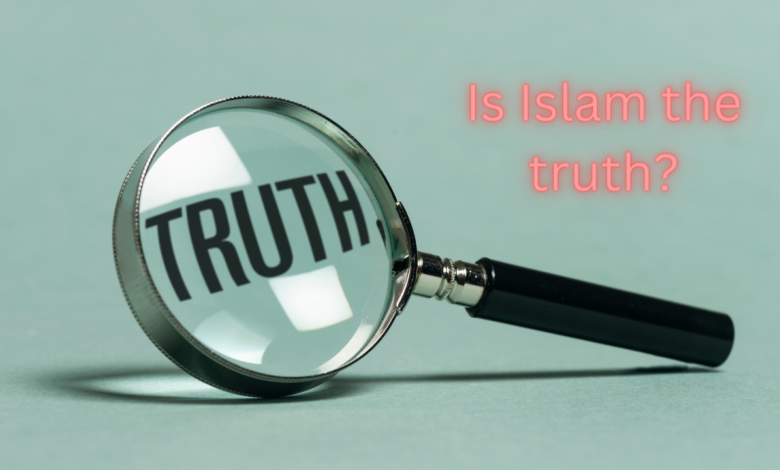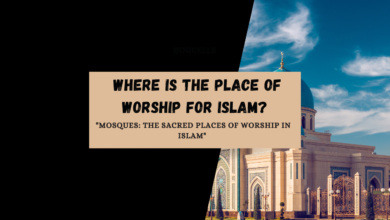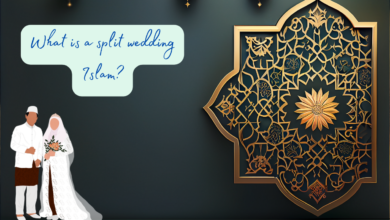
Is Islam the truth?
Islam is a monotheistic Abrahamic religion founded on the teachings of the Prophet Muhammad as recorded in the Quran. It is practiced by millions of people worldwide.

Introduction
The question of whether Islam is the truth is one that has been pondered by countless individuals throughout history. Religion, with its multifaceted beliefs, rituals, and practices, has always been a deeply personal and philosophical journey for many. Islam, one of the world’s major religions, is no exception to this contemplation. In this article, we will delve into the foundations of Islam, its beliefs, and its significance in the lives of its followers to examine whether it can be considered “the truth.”
The Foundations of Islam
Islam, which means “submission” or “surrender” in Arabic, is rooted in the belief in one God, Allah, as revealed through the Prophet Muhammad. The Quran, Islam’s holy scripture, is believed to be the literal word of God, as revealed to Muhammad over a period of 23 years. Muslims also hold the Hadith, a collection of sayings and actions of the Prophet Muhammad, as a significant source of guidance.
Central to Islam are the Five Pillars, which serve as the foundation for a Muslim’s faith and practice:
- Shahada: The declaration of faith, proclaiming that there is no god but Allah and Muhammad is His messenger.
- Salat: The practice of daily prayers, performed five times a day facing the Kaaba in Mecca.
- Zakat: The giving of alms or charity to those in need, typically calculated as a percentage of one’s wealth.
- Sawm: Fasting during the holy month of Ramadan, from sunrise to sunset.
- Hajj: The pilgrimage to the holy city of Mecca, which is obligatory for Muslims who are physically and financially able to undertake it.
Belief in the Afterlife
One of the central tenets of Islam is the belief in the Day of Judgment. Muslims hold that individuals will be resurrected and held accountable for their actions in this life. Depending on their deeds and faith, they will either be rewarded with paradise (Jannah) or face punishment in hell (Jahannam). This belief in divine justice and accountability serves as a moral compass for Muslims and is a significant aspect of their faith.
The Role of Islam in People’s Lives
For millions of people worldwide, Islam is not just a set of beliefs; it is a comprehensive way of life. Muslims follow a strict dietary code (halal), observe modest dress codes, and participate in a wide range of religious and cultural traditions. Islam shapes every aspect of life, from personal morality to social interactions and governance in many Muslim-majority countries.
The Quran serves as a source of guidance in matters ranging from ethics and family life to economics and politics. The principles of justice, compassion, and mercy are highly emphasized in Islamic teachings, with a strong emphasis on taking care of the less fortunate and maintaining a sense of community.
Islam’s Appeal and Diverse Interpretations
The appeal of Islam is not limited to any one geographic or cultural group. It is a global faith with followers from various backgrounds and walks of life. The beauty of Islam lies in its capacity to adapt to different cultures while maintaining its core beliefs and practices. However, the interpretation of Islam can vary widely, leading to diverse understandings and practices among Muslims.

Also check
- Does Islam use the old testament?
- Where are the 25 Prophets of Islam in order?
- Do you have to hide your period in Islam?
- Where is the Soul located in the body Islam?
- How to treat Women in Islam?
Conclusion: The Quest for Truth
The question of whether Islam is “the truth” is deeply subjective and varies from person to person. For Muslims, it is their unwavering faith, a guiding light that shapes their lives and provides them with purpose and meaning. However, for individuals of different faiths or those who identify as atheists or agnostics, the truth may lie in different philosophies or worldviews.
Ultimately, the quest for truth is a personal journey, one that encompasses religious, spiritual, philosophical, and ethical dimensions. It is a journey that individuals embark upon to find answers to life’s most profound questions. While Islam may be the truth for many, it is essential to respect the diversity of beliefs and worldviews that enrich our global society and promote dialogue and understanding among individuals of different faiths and backgrounds.
Frequently Asked Questions (FAQs) about Islam as the Truth
What is Islam?
Islam is a monotheistic Abrahamic religion founded on the teachings of the Prophet Muhammad as recorded in the Quran. It is practiced by millions of people worldwide.
Is Islam the only “truth” religion?
Muslims believe that Islam is the final and complete revelation from God. While they consider it to be the ultimate truth, other religions also have their own beliefs and consider them to be true.
Why do Muslims believe Islam is the truth?
Muslims believe Islam is the truth because they accept the Quran as the literal word of God. They also follow the teachings and practices of the Prophet Muhammad, whom they believe to be the final messenger of God.
Are there any objective proofs that Islam is the truth?
Belief in religion often relies on faith and personal conviction rather than empirical proof. Muslims may point to the Quran’s linguistic and literary excellence, historical accuracy, and scientific references as evidence of its divine origin.
What about other religions and their claims to truth?
Many religions make claims to ultimate truth and salvation. The belief in one’s religion often comes from personal experiences, upbringing, and cultural factors.
Can I convert to Islam if I’m not born into it?
Yes, Islam accepts converts from other religions. If you believe in the teachings of Islam and wish to embrace it, you can do so through a declaration of faith known as the Shahada.
What are the core beliefs of Islam?
The core beliefs of Islam include belief in the oneness of God (Allah), belief in angels, belief in the prophethood of Muhammad, belief in the holy books (including the Quran), belief in the Day of Judgment, and belief in predestination.
Is it necessary to follow a religion to find truth and meaning in life?
People have different paths to finding truth and meaning in life. While religion is one way for many, others may find it through philosophy, spirituality, or personal experiences.
What is the role of reason and intellect in Islam?
Islam encourages the use of reason and intellect to understand the world and seek the truth. Scholars in Islamic history have made significant contributions to philosophy, science, and mathematics.
How can I learn more about Islam and its teachings?
You can learn more about Islam through books, online resources, and by engaging in discussions with Muslims. Visiting mosques and attending educational events can also provide insights into the religion.






